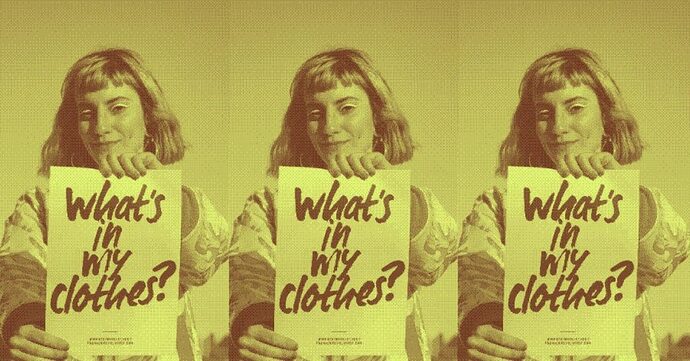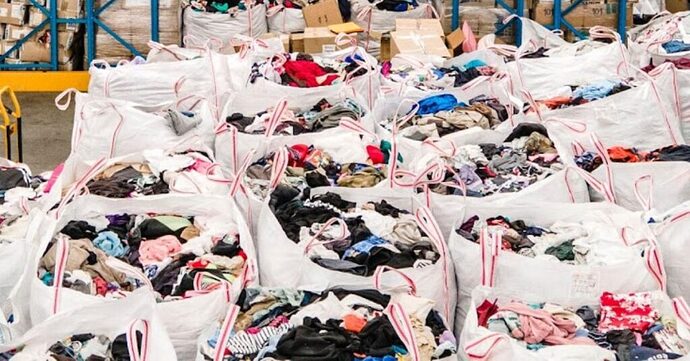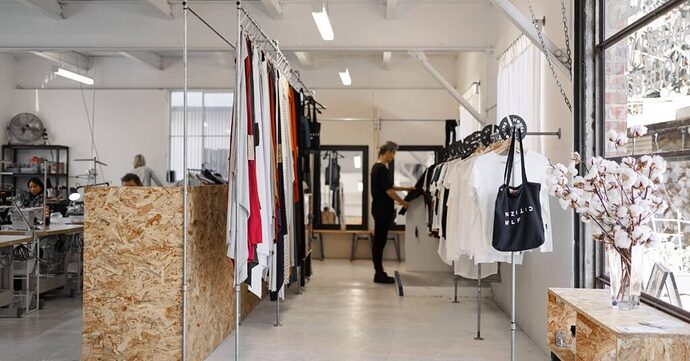Originally published at: https://bcorporation.com.au/blog/transparency-in-the-fashion-industry-event-highlights/
This year marks 10 years since the Rana Plaza garment factory collapse in Bangladesh. An event that tragically took the lives of over 1100 and injured 2500 more.
Established in the wake of Rana Plaza, the Fashion Revolution Week campaign is an annual call to action, demanding further transparency from the industry while encouraging shoppers to ask their favourite brands ‘Who made my clothes?’
As a movement driven to use business as a force for good, B Corps joined with the fashion industry during Fashion Revolution Week to honour those impacted by this horrific event. We do this by advocating for better conditions for the people that make our clothes and greater transparency from brands.
This Fashion Revolution Week we gathered three trailblazing B Corps to chat about ‘Transparency In The Fashion Industry’. We had the pleasure of being led in conversation by Patty Huntington, Features and Fashion News Director at Harper’s BAZAAR Australia, (who honoured us by referring to B Corp Certification as ‘the Olympics of sustainability’ – thank you, Patty).
Image: Fashion Revolution
Meet the panel:
Emma Wallace (Kowtow) – Offering 100% Fairtrade certified organic cotton garments, Kowtow believes that clothing can be a vessel towards a healthier planet and fairer world.
Michael Elias (UPPAREL) – UPPAREL collects unsold and post-consumer-use garments, diverting them from landfill and instead redirecting them towards reuse or textile recycling.
Eric Phu (Citizen Wolf) – Citizen Wolf creates made-to-order t-shirts in Sydney using innovative technology designed to customise garment fit and sizing for each individual customer, reducing both waste and returns.
Emma, Michael, and Eric shared with us their approach to creating positive change, their thoughts on what will drive more transparency from brands, and some of the unique challenges that come with doing business differently.
Here are just a few of our favourite, inspirational, and insightful moments from the panel.
Image: Kowtow
Patty: Along with a growing number of brands seeking certification, you’re showing the world it’s possible to be both profitable and purpose-driven. Eric, why do you think it’s important for fashion businesses to behave differently?
Eric (Citizen Wolf): I think fundamentally, fashion just isn’t sustainable in the current way that we do things. The whole business model. It just seems strange that you need to overproduce things and hit minimum quantities with factories, knowing that 30% of clothing is never going to be sold. It’s going to go into a landfill and often is made under unethical conditions. And this is accepted as being normal. To us, it just seemed absolutely insane.
Fundamentally, we feel that the world doesn’t need more fashion brands. There are plenty of them. What we need is a completely different way of working.
Patty: Emma, how do you balance sales targets with impact outcomes?
Emma (Kowtow): Obviously we are a business that requires profit to continue doing what we’re doing. But I guess from the start when you’ve got founding principles that are about putting people and planet first, every decision needs to come under that.
So we agonise on decisions, we debate decisions, and I think that’s what a responsible business needs to do now, and customers need to hold us accountable for that.
And I think the sales look after themselves. I mean, that sounds really simplistic but if you’re doing the right thing, saying the right thing, not trying to brainwash, if you’re sticking to the facts, people will come to you. I think customers enjoy that sort of honesty.
Patty: Michael, what are some of the biggest challenges in your opinion?
Michael (Upparel): We were a brand producing products with no real understanding of the impact that we were making. But we learned over time and as we understood the impact that we’re making we decided to do something about it. We made the change for ourselves. Then we started to see the benefits environmentally and socially. And then with our corporate partners, we’re seeing that when they make a positive change, that’s actually engaging very highly with their employees and driving greater commitment to the brand.
Image: UPPAREL
Patty: Talking about the supply chain and paying a living wage to workers, how do you tackle this and what do you think needs to happen across the industry to improve?
Emma (Kowtow): It’s a huge global problem. Our supply chain is based in India where there are multiple states and they’re all trying to figure out how to measure this living wage so there’s that. Being Fair Trade Certified and a B Corp, we’ve been talking about wages for a long time, from farm levels through the whole supply chain. But I think the living wage is one thing, which is really important, but also the relationship with your supply chain is really important.
You’ve heard horror stories during COVID, where brands just turned around and cancelled all of their orders. And what do those factories do? They still need to have money coming in. So it’s also looking at the holistic relationship you have with your supply chain and doing things like ensuring you don’t cancel orders, you have long-term relationships and you don’t just pick up and drop because you found a cheaper alternative.
Patty: Michael, you built your business on tackling specifically the problem of textile waste. How are you changing the way the sector, and some of the biggest players in it, manage waste?
Michael (Upparel): It’s a really interesting question, and I think we’re seeing changes more and more over time. So to give an example, when we launched our consumer model, we made it available for free and opened it up to retailers and brands across the country so that they could engage with their customers to ensure we would divert items from landfill.
What happened off the back of that was brands and retailers said ‘What about our dormant, faulty, end-of-season, and customer returns? There are a number of reasons why stock can no longer be sold.’
So we began reporting every single kilogram that came through the door, where it went and what happened to it. Then we were able to report back.
The next part was asking, how do we make recommendations to these brands to make improvements in the future? For example, let’s take a cotton tote bag – a great product. But what if we were to use a recycled PET (polyester) tag in there? It’s great that the polyester is recycled but it creates a challenge because we can’t recycle the cotton and the polyester all together. So being able to share that back to brands, back to retailers, has been great.
Our service is a paid-for service. It’s a commercial model, we pay people well and truly beyond minimum wage, and as a result of that, what it means is this cost is passed on to a brand or to a retailer. Over time what we’re going to see, for example, is a retailer overbuys by 30%. The cost to discard and ensure that the 30% doesn’t end up in landfill, starts to come off their Profit and Loss Statement. And all of a sudden, when it starts to hurt commercially, people take notice. And so it’s managing that and balancing that.
Image: Citizen Wolf
Patty: Looking at what’s next, Eric, how do we get more fashion businesses to be more transparent about the impact that they are having on the world?
Eric (Citizen Wolf): I think there’s going to be both push and pull factors. On the push side, more customers actually care about this and are advocating for it. That’s what Fashion Revolution is very much about. Along with that there’s still a lot that governments can do. And we’re already hearing from Europe, for example, that they’re going to be implementing stronger laws around greenwashing and the like.
On the pull side, I think there’s probably going to be more self-interest from businesses because a lot of us are very self-interested in terms of we have to survive and pay staff and so forth. The self-interest comes in by being transparent and actually looking at the things that you don’t do well and fixing them — by acknowledging problems and getting solutions to them. Fundamentally it’s going to be better for the bottom line. And that needs to be made more apparent.
Patty: In just a few words, what is your call to action or final message for our audience today?
Emma (Kowtow): If you are in business, just take a moment to think about some of those decisions you’re making.
Everything you do has an impact. And it can be positive, it can be negative. And I think it’s sort of our duty that we make these good choices.
Michael: As you’re making any purchase, consider what’s going to happen at the item’s end of life. And I mean, that’s with anything, whether it be fashion items or any other item.
What’s going to happen at its end of life? Is it going to last long enough? Because it has to be your responsibility as well. We can’t just buy things and discard them. It has to go somewhere.
Eric: I would say whatever it is that you think you can do to make a positive impact, just start. It doesn’t have to be big. It can be small.
All of us are on a journey. None of us are perfect from the get-go.
Fashion Revolution Week might be over for another year, but the movement doesn’t stop. You can re-watch the full panel discussion here.
Read more about how B Corps are making the future of fashion traceable and transparent here.



